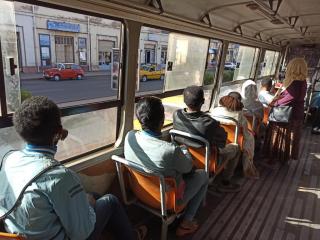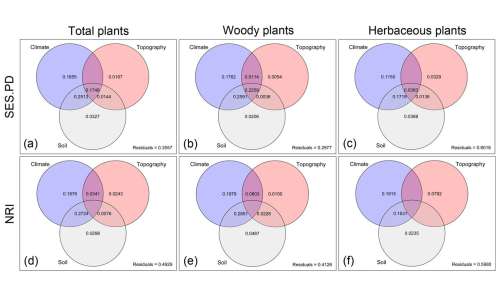
 Police hand out fliers about the coronavirus to migrant workers and asylum seekers in Tel Aviv's Neveh Sha’anan neighborhood, March 22, 2020. Credit: Moti Milrod
Asylum Seekers in Israel Forced to Fend for Themselves During Coronavirus Crisis
With no social or medical safety net, more than half have lost their jobs since the coronavirus outbreak began
By Lee Yaron
https://www.haaretz.com/israel-news/.pr ... -1.8706176
Mar 25, 2020
Police hand out fliers about the coronavirus to migrant workers and asylum seekers in Tel Aviv's Neveh Sha’anan neighborhood, March 22, 2020. Credit: Moti Milrod
Asylum Seekers in Israel Forced to Fend for Themselves During Coronavirus Crisis
With no social or medical safety net, more than half have lost their jobs since the coronavirus outbreak began
By Lee Yaron
https://www.haaretz.com/israel-news/.pr ... -1.8706176
Mar 25, 2020
Like many Israelis,
Mollo has spent more than a week in isolation after possible exposure to the coronavirus. He was told that he had been near patient number 283, a student of the
Har Etzion Yeshiva, where he worked in the cafeteria.
Like others, he spends his days within four walls, fearing for his health, livelihood and missing companionship. But there’s one detail that changes his condition from “
worrisome” to “
critical:" He’s an asylum seeker
https://www.haaretz.com/israel-news/.pr ... -1.8699624 from Eritrea. (
With the name of: Mollo? Naah!)
Unlike other Israelis who cannot work during the coronavirus crisis,
https://www.haaretz.com/israel-news/cor ... -1.8700788 Mollo, along with 30,000 other asylum seekers from Eritrea and Sudan,
https://www.haaretz.com/israel-news/.pr ... -1.8497390 is not eligible for unemployment or compensation for dismissal. These funds are held by the state as a deposit that cannot be withdrawn, and to make matters worse, He also has no savings.
The situation is very bad, I don’t know if I’ll have any job to return to,
Mollo tells Haaretz.
Everyone is in a bad situation but for our community, this situation will kill us. We live from hand to mouth, whatever we earn we use to buy food and pay rent. I’m very frightened.
 Neveh Sha’anan, March 22, 2020. Credit: Moti Milrod
Neveh Sha’anan, March 22, 2020. Credit: Moti Milrod
Asylum seekers in Israel have no social or medical safety net. They do not have national health insurance, and have to rely on private insurance, which is dependent on either their employment or an upfront payment to extend it temporarily. Meanwhile, more than half of them have lost their jobs.
Data from the Israeli
Restaurants Union show that 10,000 asylum seekers have been fired in this sector alone. Thousands more who worked at hotels have also lost their source of income. Now it appears that they all have a greater chance of coming down with the coronavirus than of finding a new job.
But even getting through the first stage, the isolation, is not easy, Mollo says. He lives in a one room flat with three roommates. That’s the only way they can afford the 2,400 shekels per month rent. When he learned that he needed to isolate himself, he had to ask his roommates to find another place to live for now. Many other asylum seekers face a similar risk in the event that they have to self-quarantine. Many live in small apartments, and share a bathroom and kitchen with several other families.
Other challenges they face include the difficulty of receiving basic information about the crisis. When Mollo tried to call the Health Ministry to find out the virus’ symptoms and receive instructions for self-isolation, he ran into obstacles. He had to key in an identity number – which he lacks - just to be able to speak with someone.
An Israeli friend helped me so I was able to talk to them [the Health Ministry]. I had no choice,
he said.
Tens of thousands go hungry
Baharana Negasi has also joined the ranks of the unemployed.
https://www.haaretz.com/israel-news/.pr ... -1.8688933 He has been living in Israel for 14 years. He worked at a Jerusalem eatery that put him on unpaid leave until further notice. But being a leading activist in the asylum seeker community has kept him very busy. His phone doesn’t stop ringing; every few minutes he gets a call from a family in dire circumstances and in need of help.
He is also attempting to arrange meetings of community leaders.
Next month none of us will be able to pay rent or have enough money to buy food,
he said.
People weren’t as fearful during the period of expulsions as they are now from the damages of the coronavirus. They’re in a panic. People don’t know what to do if they get infected, parents don’t know where they’ll find work, and this situation can develop into a complete disaster for tens of thousands of people.
 Police Officers explain new government instructions to people in Neveh Sha’anan, March 22, 2020. Credit: Moti Mildrod
Police Officers explain new government instructions to people in Neveh Sha’anan, March 22, 2020. Credit: Moti Mildrod
The magnitude of the problem is also clear at the
Aid Organization for Refugees and Asylum Seekers in Israel,
A non-governmental group that helps the asylum seekers, which is inundated with desperate appeals from families that have nothing to eat.
These are families that even in routine times were living beneath the poverty line, without any support from National Insurance, they have no reserves on the side,
said
Tali Ehrental, the director-general of ASSAF.
They can’t afford rent and we fear that they will get thrown out onto the street.
She added that many children of asylum seekers have lost their sole hot meal of the day which they got at school.
Where’s the money
Money is needed to prevent hunger, perhaps the main problem for asylum seekers. But there seems to be a solution to the asylum seekers’ lack of money: they are required to contribute 20 percent of their wage to a “
deposit fund,” to which their employer adds a 15 percent social benefit contribution. The government could release this money to the asylum seekers, which some of them have been paying this contribution for years. The money is usually kept and only given to an asylum seeker when they leave the country, thus encouraging them to leave Israel.
But there is a clause which states that the treasury or interior ministry can set the terms for when these workers can receive some or all of these funds.
Last week a number of human rights groups appealed to the treasury and interior minister to release these funds.
Shai Berman, head of the restaurants’ union, wrote to Finance Minister
Moshe Kachlon saying,
the asylum seekers will be destitute during this crisis, despite their having full compensation funds set aside.
 People stand on the street in Neve Sha'anan, March 22, 2020. Credit: Moti Milrod
People stand on the street in Neve Sha'anan, March 22, 2020. Credit: Moti Milrod
Berman said these workers had asked them for compensation so they could survive
and this only adds to the burden faced by our industry which is already deep in crisis.
This situation discriminates between them and Israeli workers. This is a serious wrong, both toward these workers and toward restaurant entrepreneurs at their most difficult hour.
Haaretz has learned that the policy is under review as a result of these appeals. Officials have agreed in principle that asylum seekers should receive 2,000 to 2500 shekels their deposit funds, but not to permit anyone to withdraw all their funds. In some cases people have tens of thousands of shekels in their fund.
A source familiar with the details said
we are working on a mechanism to allow the withdrawal of a portion of the deposit, but not the entire amount under any circumstances.
We understand that without this money the community will face a disaster by next month without any salaries,
the source said.
 Fliers about the coronavirus are handed out to asylum seekers, Neveh Sha’anan, March 22, 2020. Credit: Moti Milrod
Fliers about the coronavirus are handed out to asylum seekers, Neveh Sha’anan, March 22, 2020. Credit: Moti Milrod
According to plans, asylum seekers will receive a larger sum of money in the first month of withdrawal from the fund.
Officials are also seeking a solution for asylum seekers who have no money deposited and who cannot make a living, in order to avoid them going hungry. In addition to the money that they would spend on living, the plan states that asylum seekers would also be required to pay hundreds of shekels a month in health insurance, for which they would be entitled to withdraw further funds from their deposits.
A subcommittee was appointed at the Prime Minister’s Office this week to handle the issue of foreigners amid the coronavirus crisis, headed by Attorney
Dina Dominitz, director of the
Human Trafficking Unit in the Justice Ministry. The panel will be a forum for government, business and social and civil service group representatives, with a goal of formulating a policy within a few days and gaining approval from Interior Minister
Aryeh Deri. The committee will also seek solutions for asylum seekers who need to self-isolate, and to lower the risk of infection breaking out among them.
Sensitive information
Economic difficulties have for now overshadowed the other fears faced by asylum seekers, though these concerns have not disappeared. But the fear of wider infection from the coronavirus and the need for people to self-isolate, has raised these issues anew.
Sources at
Physicians for Human Rights say asylum seekers worry that any personal details they give the Health Ministry could be leaked to
Population Authority personnel, who could seek to deport them.
It is also unclear who would fund medical care for those with no status if they are infected with the coronavirus. The Health Ministry has ordered hospitals and
Magen David Adom to provide treatment with no questions asked about medical insurance.
It’s definitely a step in the right direction but we still haven’t seen how this is actually carried out,
said Dr.
Zoe Gutzeit, of PHR’s immigration department.
Not everyone who has symptoms will be hospitalized, and who is going to treat someone without insurance in these times?
Gutzeit said.
There is also the question of who will speak to these people and how. Again, the problem of communication problems between the state and the asylum seekers arises. It’s not just a matter of having an identity number to key in on a helpline. For the most part information is not provided to this community in their language. PHR says that as a result of their appeals, the Health Ministry has translated some information into other languages, among them Tigrinya, which is spoken in Eritrea. But the translation takes some time and the information made available is often outdated.
A document circulated by the city of Tel Aviv in English urged people to stay home except to purchase food, medicine, or see the doctor. There was no mention of permission to leave the home in certain other instances such as to go or a walk or to go to work.
Compounding the fears felt by asylum seekers is their exposure to inaccurate information from the Health Ministry,
said
Sigal Rozen, founder of the
Hotline for Refugees and Migrants.
Many of them think erroneously that they are not allowed to go out to work and that they cannot leave their homes for any reason. This only intensifies their distress and fears.
The Tel Aviv Municipality said it has worked to make this information available in English and Tigrinya in the Neve Sha’anan neighborhood, where many asylum seekers live. They are working jointly with the
Mesila organization that helps foreigners, and have posted 5,000 flyers in these languages with Health Ministry instructions. These instructions have also been issued over loudspeakers.
Whether these efforts are enough isn’t altogether clear, but on Monday the city took another step, after protests from human rights groups’, sending representatives to Neve Sha’anan to speak to residents.
 Lee Yaron: Haaretz Contributor
Lee Yaron: Haaretz Contributor










